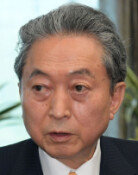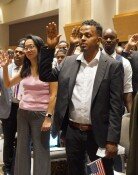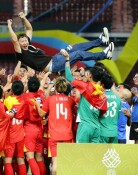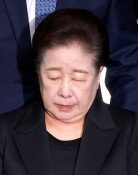[Editorial] Meeting Between Chung Dong-Young and Kim Jong Il Is No Grounds for Excitement
[Editorial] Meeting Between Chung Dong-Young and Kim Jong Il Is No Grounds for Excitement
Posted June. 18, 2005 04:32,
Minister of Unification Chung Dong-young met National Defense Committee Chairman Kim Jong Il yesterday in Pyongyang. The two are said to have shared their opinions over the North Korean nuclear standoff and ways to improve inter-Korean ties in a relatively frank and open manner. This is the first meeting between a unification minister and Chairman Kim over the last five years, and we sincerely hope this meeting bears fruit in a significant way. This is not a matter for excitement, however, and we should first take a thorough look at the actual results of the talks.
Sources say the response from the government and the ruling Uri Party was that Chung, a likely candidate for the next presidency, Finally hit the jackpot. They should not have responded that way. Inconsistent support for and a low posture toward the North both derive from their politically motivated approach to inter-Korean affairs.
The way Chairman Kim accepted the meeting with the South Korean unification minister was a typical of his surprising appearances. It is an old trick to impress South Korean negotiators by pretending right until the end that talks would be unlikely before suddenly accepting the request for a meeting at the last minute. Now it is time for our side to dismiss such meetings.
The talks with Kim were the finale of the June 15 festivities in Pyongyang, but the Norths real intention was fully represented in the Norths Organizing Committee Vice-President Kim Jong Hos remarks in a press conference where he said, The South Korean government should be more active in saying what it has to say to the United States based on national cooperation. While chanting national cooperation on the surface, North Korea calls upon the United States to recognize [North Korea] as a nuclear power behind the scenes. Then what on earth is national cooperation for? National cooperation for the approval of nuclear possession can never be tolerated.
Despite the recent meeting, these fundamental questions remain unsolved. And from the perspective of the United States, problems seem even more complicated. Christopher Hill, assistant secretary of state for East Asian and Pacific affairs, made it clear that he would mention human rights issues in future bilateral talks between North Korea and the United States. We wonder whether Chung ever made one single remark on the human rights of North Korean residents during his stay in Pyongyang.
Dialogue is necessary, of course. Talks with Chairman Kim Jong Il are also needed. Nevertheless, such efforts should be made on the basis of principles to which most people agree. But behaving in a way that the meeting with Kim itself is an honor could ruin even the achievable in the future.







